ROC-RK3568-PC
本文详细介绍 AxVisor + Linux 客户机、AxVisor + ArceOS 客户机 以及 AxVisor + Linux 客户机 和 ArceOS 客户机三种情况在 ROC-RK3568-PC 开发板上的构建、部署及运行!
开发环境
AxVisor 及 ROC-RK3568-PC 的 SDK 仅支持在 Linux 系统进中进行开发。本文中的构建及部署环境均采用 Ubuntu 24.04 系统作为开发环境。
-
ROC-RK3568-PC 的 SDK 本身不支持使用 Python3 来构建,需要稍加修改,文中会给出相关修改
-
如果不使用 Python3 环境,则需要手动安装 Python2 环境,因为很多新的 Linux 发行版本,例如, Ubuntu 24.04,默认已经不提供 Python2 的相关包了
构建
准备 AxVisor 镜像 + Linux 客户机镜像。
构建 Linux 客户机镜像
根据 ROC-RK3568-PC 开发板官方文档,构建 Linux 客户机镜像。
获取 SDK
下载 Firefly 提供的 SDK(整个文件夹)。下载的 SDK 实际上是由 repo 工具管理的一个仓库的源码的压缩包(一个 TAG 版本)及相关说明文档,需要解压之后再使用 repo 命令来恢复 SDK 的内容。

-
执行
chmod +x ./sdk_tools.sh给脚本执行权限。 -
执行
mkdir ../firefly_rk3568_sdk在当前压�缩包的上一级目录创建一个文件夹,存放实际 SDK 内容。 -
执行
./sdk_tools.sh --unpack -C ../firefly_rk3568_sdk解压 SDK 仓库压缩包。其中实际上只有一个.repo文件夹,需要进一步恢复 SDK 内容
-
使用
./sdk_tools.sh --sync -C ../firefly_rk3568_sdk命令恢复 SDK 内容。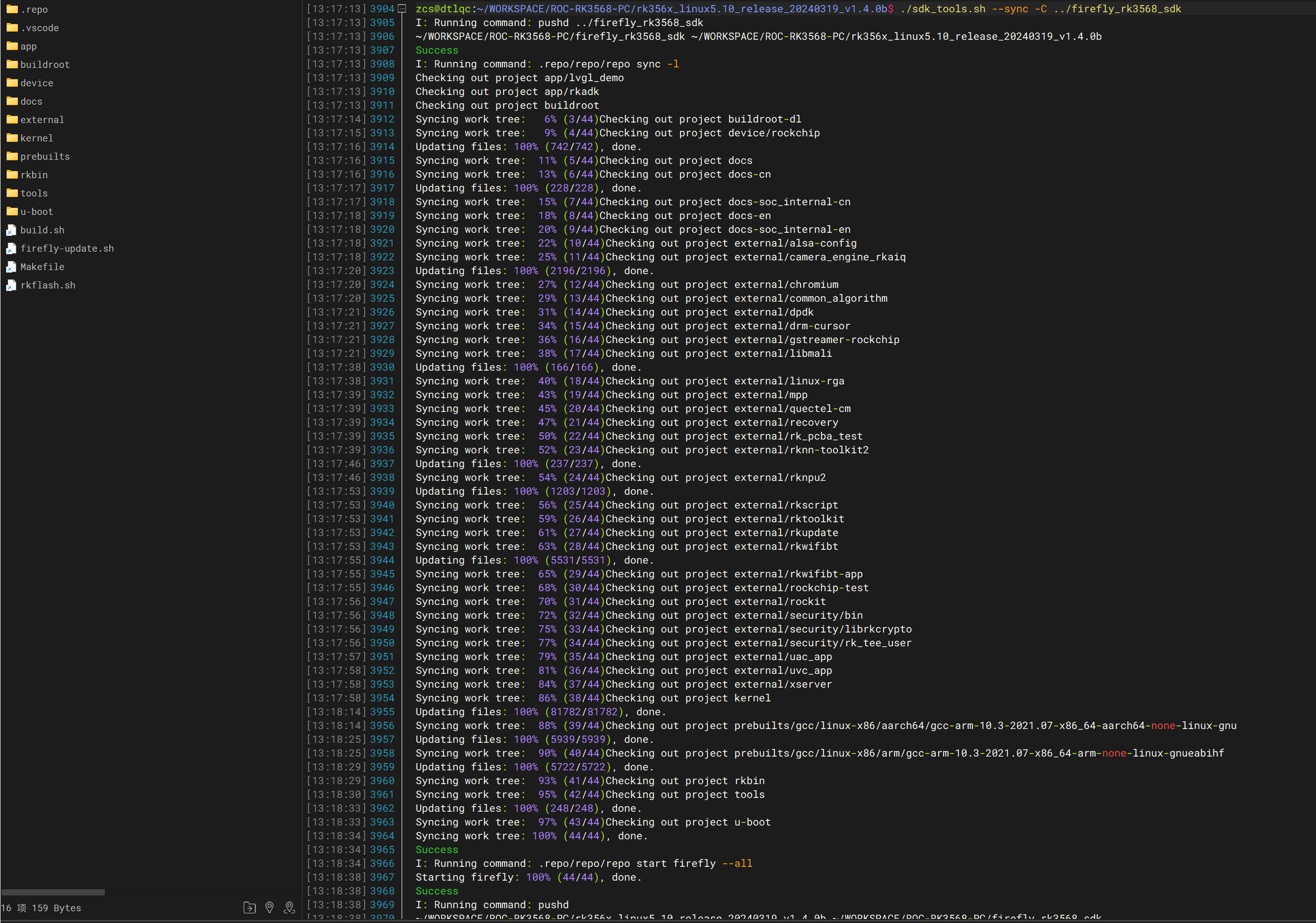
也可以
cd ../firefly_rk3568_sdk之后,手动执行如下命令:.repo/repo/repo sync -l
.repo/repo/repo start firefly --all注意: 如果当前构建环境系统中 Python 版本是 3.12 及以上,由于 SDK 中的
repo版本比较旧,则需要进行修改才能适配 Python 的 3.10 及以上版本-
编辑
../firefly_rk3568_sdk/.repo/repo/main.py中的如下所示的内容(imp在 Python 的 3.4 版本中被标记为过时(由importlib代替),并最终在 3.12 版本中被删除):
-
新建
.repo/repo/formatter.py文件(Python 3.10 及以上版本中formatter.py过时已经被删除),并在其中输入以下内容:"""Generic output formatting.
Formatter objects transform an abstract flow of formatting events into
specific output events on writer objects. Formatters manage several stack
structures to allow various properties of a writer object to be changed and
restored; writers need not be able to handle relative changes nor any sort
of ``change back'' operation. Specific writer properties which may be
controlled via formatter objects are horizontal alignment, font, and left
margin indentations. A mechanism is provided which supports providing
arbitrary, non-exclusive style settings to a writer as well. Additional
interfaces facilitate formatting events which are not reversible, such as
paragraph separation.
Writer objects encapsulate device interfaces. Abstract devices, such as
file formats, are supported as well as physical devices. The provided
implementations all work with abstract devices. The interface makes
available mechanisms for setting the properties which formatter objects
manage and inserting data into the output.
"""
import sys
import warnings
warnings.warn('the formatter module is deprecated', DeprecationWarning,
stacklevel=2)
AS_IS = None
class NullFormatter:
"""A formatter which does nothing.
If the writer parameter is omitted, a NullWriter instance is created.
No methods of the writer are called by NullFormatter instances.
Implementations should inherit from this class if implementing a writer
interface but don't need to inherit any implementation.
"""
def __init__(self, writer=None):
if writer is None:
writer = NullWriter()
self.writer = writer
def end_paragraph(self, blankline): pass
def add_line_break(self): pass
def add_hor_rule(self, *args, **kw): pass
def add_label_data(self, format, counter, blankline=None): pass
def add_flowing_data(self, data): pass
def add_literal_data(self, data): pass
def flush_softspace(self): pass
def push_alignment(self, align): pass
def pop_alignment(self): pass
def push_font(self, x): pass
def pop_font(self): pass
def push_margin(self, margin): pass
def pop_margin(self): pass
def set_spacing(self, spacing): pass
def push_style(self, *styles): pass
def pop_style(self, n=1): pass
def assert_line_data(self, flag=1): pass
class AbstractFormatter:
"""The standard formatter.
This implementation has demonstrated wide applicability to many writers,
and may be used directly in most circumstances. It has been used to
implement a full-featured World Wide Web browser.
"""
# Space handling policy: blank spaces at the boundary between elements
# are handled by the outermost context. "Literal" data is not checked
# to determine context, so spaces in literal data are handled directly
# in all circumstances.
def __init__(self, writer):
self.writer = writer # Output device
self.align = None # Current alignment
self.align_stack = [] # Alignment stack
self.font_stack = [] # Font state
self.margin_stack = [] # Margin state
self.spacing = None # Vertical spacing state
self.style_stack = [] # Other state, e.g. color
self.nospace = 1 # Should leading space be suppressed
self.softspace = 0 # Should a space be inserted
self.para_end = 1 # Just ended a paragraph
self.parskip = 0 # Skipped space between paragraphs?
self.hard_break = 1 # Have a hard break
self.have_label = 0
def end_paragraph(self, blankline):
if not self.hard_break:
self.writer.send_line_break()
self.have_label = 0
if self.parskip < blankline and not self.have_label:
self.writer.send_paragraph(blankline - self.parskip)
self.parskip = blankline
self.have_label = 0
self.hard_break = self.nospace = self.para_end = 1
self.softspace = 0
def add_line_break(self):
if not (self.hard_break or self.para_end):
self.writer.send_line_break()
self.have_label = self.parskip = 0
self.hard_break = self.nospace = 1
self.softspace = 0
def add_hor_rule(self, *args, **kw):
if not self.hard_break:
self.writer.send_line_break()
self.writer.send_hor_rule(*args, **kw)
self.hard_break = self.nospace = 1
self.have_label = self.para_end = self.softspace = self.parskip = 0
def add_label_data(self, format, counter, blankline = None):
if self.have_label or not self.hard_break:
self.writer.send_line_break()
if not self.para_end:
self.writer.send_paragraph((blankline and 1) or 0)
if isinstance(format, str):
self.writer.send_label_data(self.format_counter(format, counter))
else:
self.writer.send_label_data(format)
self.nospace = self.have_label = self.hard_break = self.para_end = 1
self.softspace = self.parskip = 0
def format_counter(self, format, counter):
label = ''
for c in format:
if c == '1':
label = label + ('%d' % counter)
elif c in 'aA':
if counter > 0:
label = label + self.format_letter(c, counter)
elif c in 'iI':
if counter > 0:
label = label + self.format_roman(c, counter)
else:
label = label + c
return label
def format_letter(self, case, counter):
label = ''
while counter > 0:
counter, x = divmod(counter-1, 26)
# This makes a strong assumption that lowercase letters
# and uppercase letters form two contiguous blocks, with
# letters in order!
s = chr(ord(case) + x)
label = s + label
return label
def format_roman(self, case, counter):
ones = ['i', 'x', 'c', 'm']
fives = ['v', 'l', 'd']
label, index = '', 0
# This will die of IndexError when counter is too big
while counter > 0:
counter, x = divmod(counter, 10)
if x == 9:
label = ones[index] + ones[index+1] + label
elif x == 4:
label = ones[index] + fives[index] + label
else:
if x >= 5:
s = fives[index]
x = x-5
else:
s = ''
s = s + ones[index]*x
label = s + label
index = index + 1
if case == 'I':
return label.upper()
return label
def add_flowing_data(self, data):
if not data: return
prespace = data[:1].isspace()
postspace = data[-1:].isspace()
data = " ".join(data.split())
if self.nospace and not data:
return
elif prespace or self.softspace:
if not data:
if not self.nospace:
self.softspace = 1
self.parskip = 0
return
if not self.nospace:
data = ' ' + data
self.hard_break = self.nospace = self.para_end = \
self.parskip = self.have_label = 0
self.softspace = postspace
self.writer.send_flowing_data(data)
def add_literal_data(self, data):
if not data: return
if self.softspace:
self.writer.send_flowing_data(" ")
self.hard_break = data[-1:] == '\n'
self.nospace = self.para_end = self.softspace = \
self.parskip = self.have_label = 0
self.writer.send_literal_data(data)
def flush_softspace(self):
if self.softspace:
self.hard_break = self.para_end = self.parskip = \
self.have_label = self.softspace = 0
self.nospace = 1
self.writer.send_flowing_data(' ')
def push_alignment(self, align):
if align and align != self.align:
self.writer.new_alignment(align)
self.align = align
self.align_stack.append(align)
else:
self.align_stack.append(self.align)
def pop_alignment(self):
if self.align_stack:
del self.align_stack[-1]
if self.align_stack:
self.align = align = self.align_stack[-1]
self.writer.new_alignment(align)
else:
self.align = None
self.writer.new_alignment(None)
def push_font(self, font):
size, i, b, tt = font
if self.softspace:
self.hard_break = self.para_end = self.softspace = 0
self.nospace = 1
self.writer.send_flowing_data(' ')
if self.font_stack:
csize, ci, cb, ctt = self.font_stack[-1]
if size is AS_IS: size = csize
if i is AS_IS: i = ci
if b is AS_IS: b = cb
if tt is AS_IS: tt = ctt
font = (size, i, b, tt)
self.font_stack.append(font)
self.writer.new_font(font)
def pop_font(self):
if self.font_stack:
del self.font_stack[-1]
if self.font_stack:
font = self.font_stack[-1]
else:
font = None
self.writer.new_font(font)
def push_margin(self, margin):
self.margin_stack.append(margin)
fstack = [m for m in self.margin_stack if m]
if not margin and fstack:
margin = fstack[-1]
self.writer.new_margin(margin, len(fstack))
def pop_margin(self):
if self.margin_stack:
del self.margin_stack[-1]
fstack = [m for m in self.margin_stack if m]
if fstack:
margin = fstack[-1]
else:
margin = None
self.writer.new_margin(margin, len(fstack))
def set_spacing(self, spacing):
self.spacing = spacing
self.writer.new_spacing(spacing)
def push_style(self, *styles):
if self.softspace:
self.hard_break = self.para_end = self.softspace = 0
self.nospace = 1
self.writer.send_flowing_data(' ')
for style in styles:
self.style_stack.append(style)
self.writer.new_styles(tuple(self.style_stack))
def pop_style(self, n=1):
del self.style_stack[-n:]
self.writer.new_styles(tuple(self.style_stack))
def assert_line_data(self, flag=1):
self.nospace = self.hard_break = not flag
self.para_end = self.parskip = self.have_label = 0
class NullWriter:
"""Minimal writer interface to use in testing & inheritance.
A writer which only provides the interface definition; no actions are
taken on any methods. This should be the base class for all writers
which do not need to inherit any implementation methods.
"""
def __init__(self): pass
def flush(self): pass
def new_alignment(self, align): pass
def new_font(self, font): pass
def new_margin(self, margin, level): pass
def new_spacing(self, spacing): pass
def new_styles(self, styles): pass
def send_paragraph(self, blankline): pass
def send_line_break(self): pass
def send_hor_rule(self, *args, **kw): pass
def send_label_data(self, data): pass
def send_flowing_data(self, data): pass
def send_literal_data(self, data): pass
class AbstractWriter(NullWriter):
"""A writer which can be used in debugging formatters, but not much else.
Each method simply announces itself by printing its name and
arguments on standard output.
"""
def new_alignment(self, align):
print("new_alignment(%r)" % (align,))
def new_font(self, font):
print("new_font(%r)" % (font,))
def new_margin(self, margin, level):
print("new_margin(%r, %d)" % (margin, level))
def new_spacing(self, spacing):
print("new_spacing(%r)" % (spacing,))
def new_styles(self, styles):
print("new_styles(%r)" % (styles,))
def send_paragraph(self, blankline):
print("send_paragraph(%r)" % (blankline,))
def send_line_break(self):
print("send_line_break()")
def send_hor_rule(self, *args, **kw):
print("send_hor_rule()")
def send_label_data(self, data):
print("send_label_data(%r)" % (data,))
def send_flowing_data(self, data):
print("send_flowing_data(%r)" % (data,))
def send_literal_data(self, data):
print("send_literal_data(%r)" % (data,))
class DumbWriter(NullWriter):
"""Simple writer class which writes output on the file object passed in
as the file parameter or, if file is omitted, on standard output. The
output is simply word-wrapped to the number of columns specified by
the maxcol parameter. This class is suitable for reflowing a sequence
of paragraphs.
"""
def __init__(self, file=None, maxcol=72):
self.file = file or sys.stdout
self.maxcol = maxcol
NullWriter.__init__(self)
self.reset()
def reset(self):
self.col = 0
self.atbreak = 0
def send_paragraph(self, blankline):
self.file.write('\n'*blankline)
self.col = 0
self.atbreak = 0
def send_line_break(self):
self.file.write('\n')
self.col = 0
self.atbreak = 0
def send_hor_rule(self, *args, **kw):
self.file.write('\n')
self.file.write('-'*self.maxcol)
self.file.write('\n')
self.col = 0
self.atbreak = 0
def send_literal_data(self, data):
self.file.write(data)
i = data.rfind('\n')
if i >= 0:
self.col = 0
data = data[i+1:]
data = data.expandtabs()
self.col = self.col + len(data)
self.atbreak = 0
def send_flowing_data(self, data):
if not data: return
atbreak = self.atbreak or data[0].isspace()
col = self.col
maxcol = self.maxcol
write = self.file.write
for word in data.split():
if atbreak:
if col + len(word) >= maxcol:
write('\n')
col = 0
else:
write(' ')
col = col + 1
write(word)
col = col + len(word)
atbreak = 1
self.col = col
self.atbreak = data[-1].isspace()
def test(file = None):
w = DumbWriter()
f = AbstractFormatter(w)
if file is not None:
fp = open(file)
elif sys.argv[1:]:
fp = open(sys.argv[1])
else:
fp = sys.stdin
try:
for line in fp:
if line == '\n':
f.end_paragraph(1)
else:
f.add_flowing_data(line)
finally:
if fp is not sys.stdin:
fp.close()
f.end_paragraph(0)
if __name__ == '__main__':
test()
-
-
更新 SDK。上面的 4 个步骤只需要执行一次,后续更新则都在
firefly_rk3568_sdk目录中执行.repo/repo/repo sync -c --no-tags即可,其中的build.sh就是构建入口。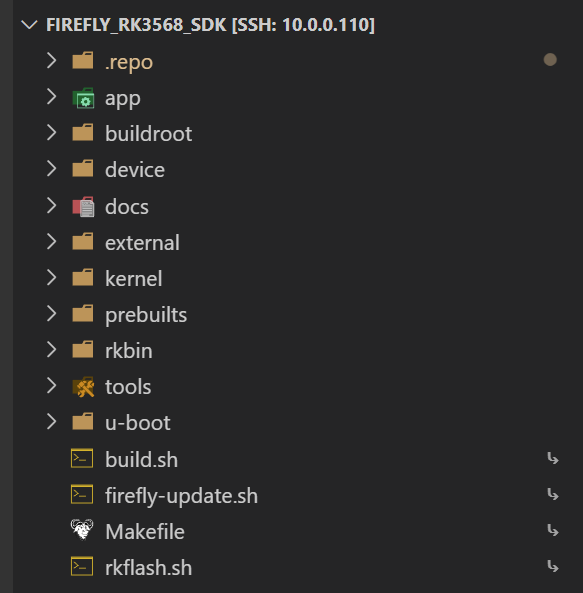
移植适配
ROC-RK3568-PC 的 SDK 不支持使用 Python3 来构建,如果当前构建环境系统中 Python 版本是 Python3 版本,则需要做如下修改:
-
修改
u-boot/make.sh中的如下位置来取消对于 Python2 的检测
实际上,U-Boot 源码中还有大量基于 Python2 的脚本文件,在默认的构建中没有用的,因此这里不再继续修改
构建过程
在初次执行 ./build.sh 时会强制选择配置文件,选择之后会创建 output/defconfig ,后续构建时就会默认使用此配置文件(可以通过 ./build.sh cleanall 清理后再次选择)。
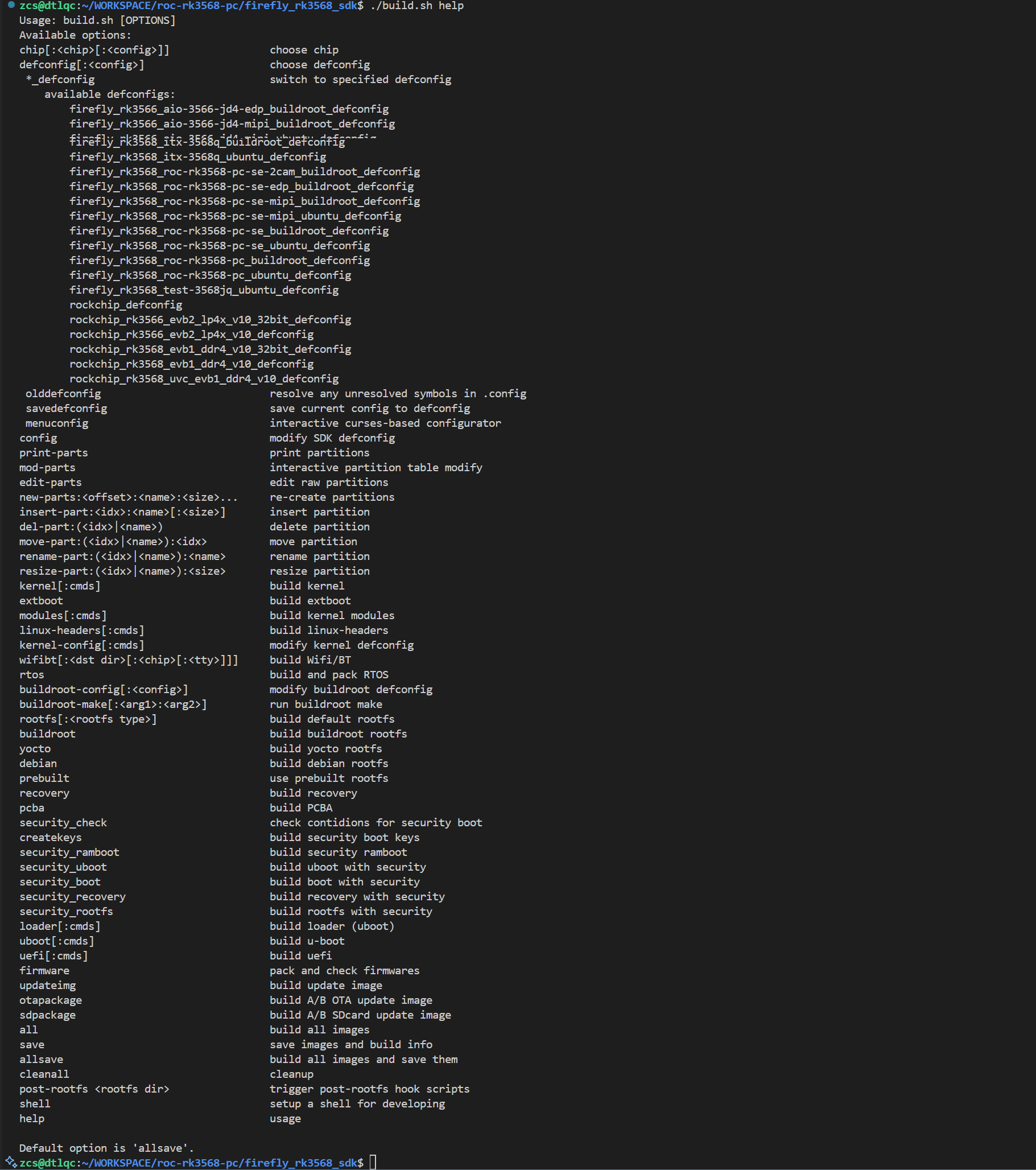
-
首先
sudo apt install git ssh make gcc libssl-dev liblz4-tool expect expect-dev g++ patchelf chrpath gawk texinfo chrpath diffstat binfmt-support qemu-user-static live-build bison flex fakeroot cmake gcc-multilib g++-multilib unzip device-tree-compiler ncurses-dev libgucharmap-2-90-dev bzip2 expat cpp-aarch64-linux-gnu libgmp-dev libmpc-dev bc python-is-python3安装依赖工具包。如果使用 Python2 环境,则不要安装
python-is-python3这个包 -
如果要构建 Ubuntu 的 rootfs(下一步配置文件时选择),则需要首先下载预编译的 Ubuntu 镜像(SDK 不支持从源码构建)并放置到 SDK 根目录的
prebuilt_rootfs文件夹中-
从 https://www.t-firefly.com/doc/download/107.html 中给出网盘中下载任意一个 rootfs 镜像,例如
Ubuntu20.04-xxx_RK3568_KERNEL-5.10_xxx.7z -
执行
7z x Ubuntu20.04-xxx_RK3568_KERNEL-5.10_xxx.7z解压到 SDK 根目录的prebuilt_rootfs(需自行创建) 中,并将其命名为rk356x_ubuntu_rootfs.img
-
-
执行
./build.sh,然后选择firefly_rk3568_roc-rk3568-pc_ubuntu_defconfig对应编号30号(也可以选firefly_rk3568_roc-rk3568-pc_buildroot_defconfig对应的31号)进行构建即可。正常编译完成之后,就会在output目录下生成各个镜像文件,我们需要编辑某些镜像,将其中的文件替换或添加成我们自己的文件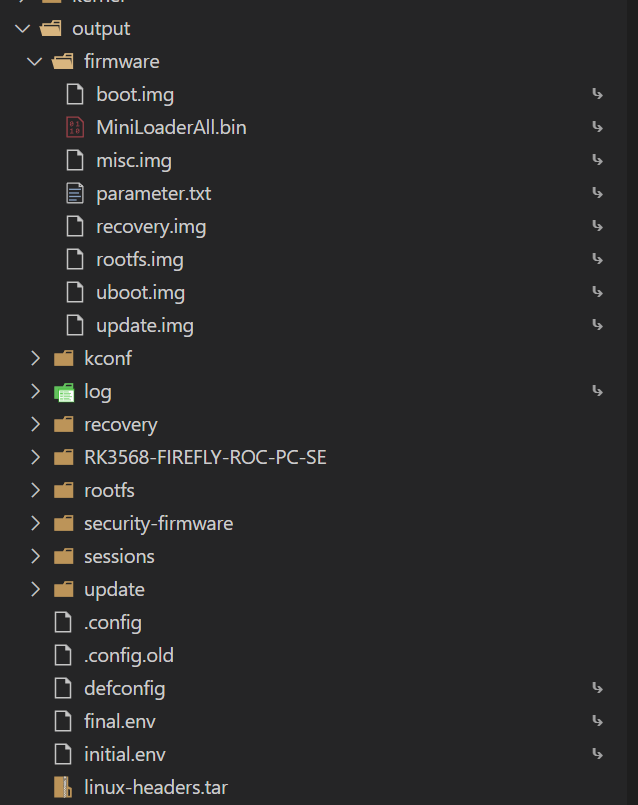
构建 ArceOS 客户机镜像
-
直接
git clone https://github.com/arceos-hypervisor/arceos -b hypervisor获取源码 -
执行
make A=examples/helloworld PLATFORM=aarch64-dyn SMP=1 LOG=info构建 ArceOS 镜像。注意,其中的参数SMP=1需要与客户机配置文件中分配的 CPU 数量一致!
构建 AxVisor 镜像
准备客户机设备树
在 AxVisor 源码的 configs/vms 目录下有适用于 ROC-RK3568-PC 开发板的设备树源码文件 linux-aarch64-rk3568_smp1.dts、linux-aarch64-rk3568_smp2.dts、arceos-aarch64-rk3568_smp1.dts、arceos-aarch64-rk3568_smp2.dts,根据需要选择即可。
-
客户机设备树也是一个文件文件�,其中记录了实际传递给客户机的设备信息,其中的 CPU、内存、设备信息等必须与客户机配置文件中的相对应。
-
使用命令
dtc -I dts -O dtb -o configs/vms/linux-aarch64-rk3568_smp1.dtb configs/vms/linux-aarch64-rk3568_smp1.dts编译为 DTB 来使用
准备客户机配置文件
客户机配置文件是一个文本文件,其中不但记录了客户机的 ID 、镜像及设备树位置等基本信息,还记录了分配给它的 CPU 号、内存、设备等信息,AxVisor 根据客户机配置文件中的信息来加载启动客户机镜像。
在 AxVisor 源码的 configs/vms 目录下有适用于 ROC-RK3568-PC 开发板的客户机配置文件 linux-aarch64-rk3568_smp1.toml、linux-aarch64-rk3568_smp2.toml、arceos-aarch64-rk3568_smp1.toml、arceos-aarch64-rk3568_smp2.toml,根据需要选择即可。
当前,AxVisor 支持从文件系统加载客户机镜像和从内存中加载客户机镜像两种方式,通过客户机配置文件中的 image_location 配置项进行区分,我们需要根据需求来修改配置文件。
-
从文件系统加载时,则确保如下配置项内容:
image_location = "fs"kernel_path = "/guest/Image", 这里需要配置为客户机镜像在 ROC-RK3568-PC 开发板中的文件系统中的绝对路径,客户机镜像就是上一步 构建 Linux 客户机镜像 生成的 Linux 内核镜像kernel/arch/arm64/boot/Imagedtb_path = "/guest/linux-aarch64-rk3568_smp1.dtb",这里配置为客��户机设备树在 ROC-RK3568-PC 开发板中的文件系统中的绝对路,客户机设备树就是上一步 准备客户机设备树 中构建的 DTB 文件
-
从内存加载时,则确保如下配置项内容:
image_location = "memory"kernel_path = "客户机镜像在当前构建环境中的绝对路径",客户机镜像就是上一步 构建 Linux 客户机镜像 生成的 Linux 内核镜像kernel/arch/arm64/boot/Imagedtb_path = "客户机设备树在当前构建环境中的绝对路径",客户机设备树就是上一步 准备客户机设备树 中构建的 DTB 文件
其他配置项根据需要自行修改,否则直接采用默认值即可!
构建过程
-
执行
./axvisor.sh defconfig以设置开发环境并生成 AxVisor 配置文件.hvconfig.toml。 -
编辑生成的
.hvconfig.toml,将vmconfigs项设置为指向 Linux 的客户机配置文件(可同时设置多个),例如:# Platform for Axvisor
plat = "aarch64-generic"
# Build arguments for ArceOS
arceos_args = ["BUS=mmio", "LOG=debug"]
# ArceOS additional features
arceos_features = []
vmconfigs = [ "configs/vms/linux-aarch64-rk3568_smp1.toml",] -
执行
./axvisor.sh build构建 AxVisor 镜像。
部署
由于瑞芯微提供的 SDK 对整个部署方式进行了预定义,难以实现自定义部署方式,因此,我们通过构建后编辑瑞芯微原生镜像的方式来实现部署。整个部署操作要求在上面构建的 Linux 客户机镜像的 SDK 目录中来执行相关命令,以便直接借用 SDK 生成的各种镜像和工具。
从文件系统部署
从文件系统部署是指将 AxVisor 镜像和 Linux 客户机镜像及其设备树独立部署在 ROC-RK3568-PC 开发板上的 eMMC 存储器中,AxVisor 启动后从文件系统中加载 Linux 客户机镜像及其设备树进而启动 Linux 客户机的方式。
修改 boot.img
�使用 ROC-RK3568-PC 的 SDK 默认会生成一个独立的 boot.img,其中存放了 Linux 内核镜像、设备树等相关文件。我们需要将 boot.img 中的 Linux 内核镜像替换成我们的 AxVisor 的镜像,以此就可以实现让 Bootloader 加载运行 AxVisor 镜像。
boot.img 实际是一个 ext4 文件系统镜像,直接以 ext4 格式挂载 output/firmware/boot.img 镜像文件,然后在其中添加客户机配置文件即可
-
挂载 boot.img。
mkdir boot,sudo mount boot.img boot -
复制 AxVisor 镜像。
sudo cp axvisor_aarch64-generic.bin boot/Image-5.10.198,这里我们直接重命名 AxVisor 镜像并覆盖原有的 Linux 内核镜像! -
卸载。
sudo umount boot
添加客户机配置
我们需要在根文件系统中添加客户机的镜像及设备树文件。直接以 ext4 格式挂载 output/firmware/rootfs.img 镜像文件,然后在其中添加客户机配置文件即可
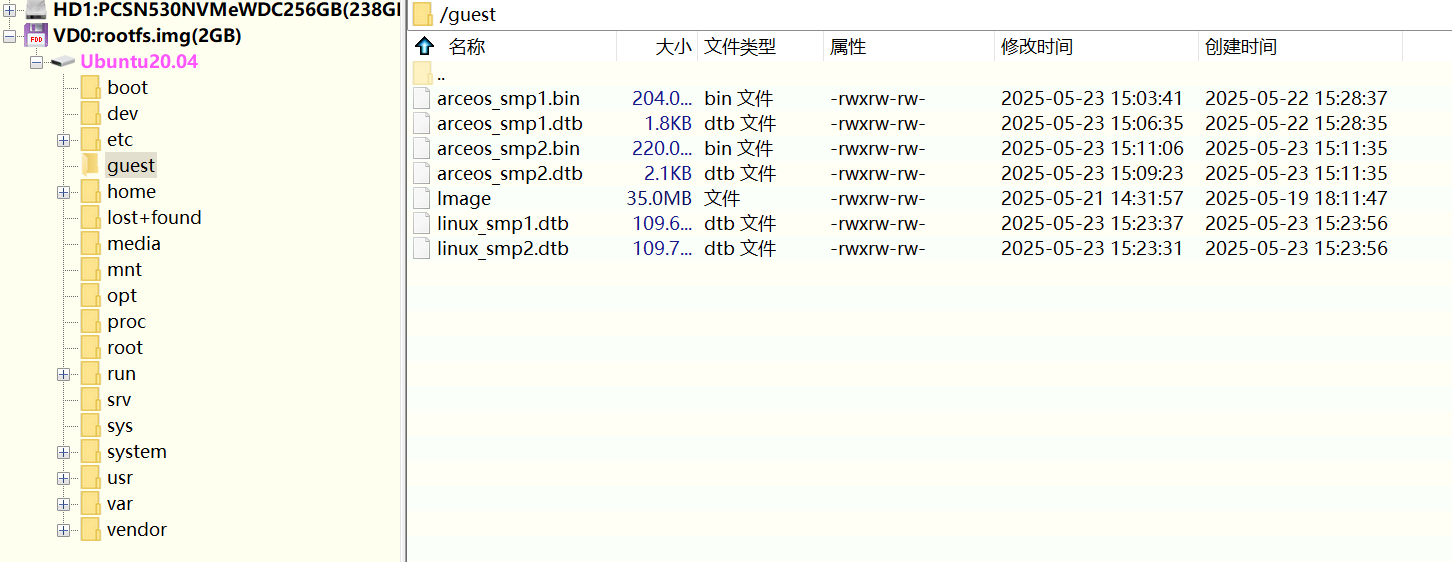
新建 /guest 目录中存放客户机配置文件、客户机镜像等文件,Hypervisor 默认会从 /guest 目录中加载客户机的文件进而启动客户机
烧写
替换完成相关文件之后,分别将修改之后的 rootfs.img 和 boot.img 烧写的对应的位置即可。最后上电启动开发板即可
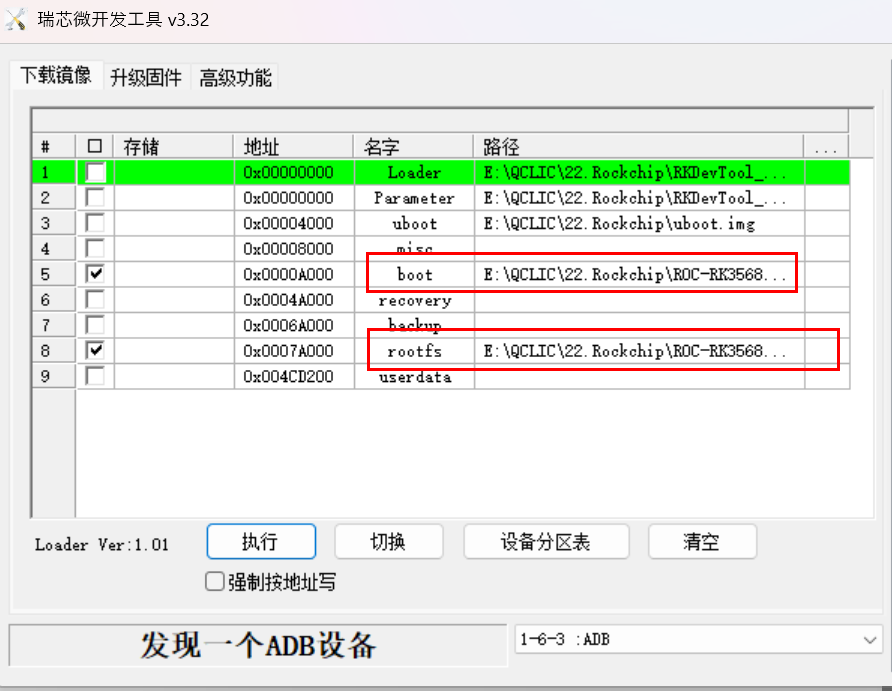
从内存部署
从内存部署是指在构建时已经将 AxVisor 镜像与 Linux 客户机镜像及其设备树打包在了一起,而只需要将 AxVisor 本身部署在 ROC-RK3568-PC 开发板上的 eMMC 存储器中,AxVisor 启动后从内存中加载 Linux 客户机镜像及其设备树进而启动 Linux 客户机的方式。
修改 boot.img
使用 ROC-RK3568-PC 的 SDK 生成了一个独立的 boot.img,其中存放了 Linux 内核镜像、设备树等相关文件。我们需要将 boot.img 中的 Linux 内核镜像替换成我们的 AxVisor 的镜像,以此就可以实现让 Bootloader 加载运行 AxVisor 镜像。
boot.img 实际是一个 ext4 文件系统镜像,直接以 ext4 格式挂载 output/firmware/boot.img 镜像文件,然后在其中添加客户机配置文件即可
-
挂载 boot.img。
mkdir boot,sudo mount boot.img boot -
复制 AxVisor 镜像。
sudo cp axvisor_aarch64-generic.bin boot/Image-5.10.198,这里我们直接重命名 AxVisor 镜像并覆盖原有的 Linux 内核镜像! -
卸载。
sudo umount boot
烧写
替换完成相关文件之后,分别将修改之后的 rootfs.img 和用 SDK 生成原始的 boot.img(Linux 客户机启动之后会使用) 烧写的对应的位置即可。最后上电启动开发板即可
